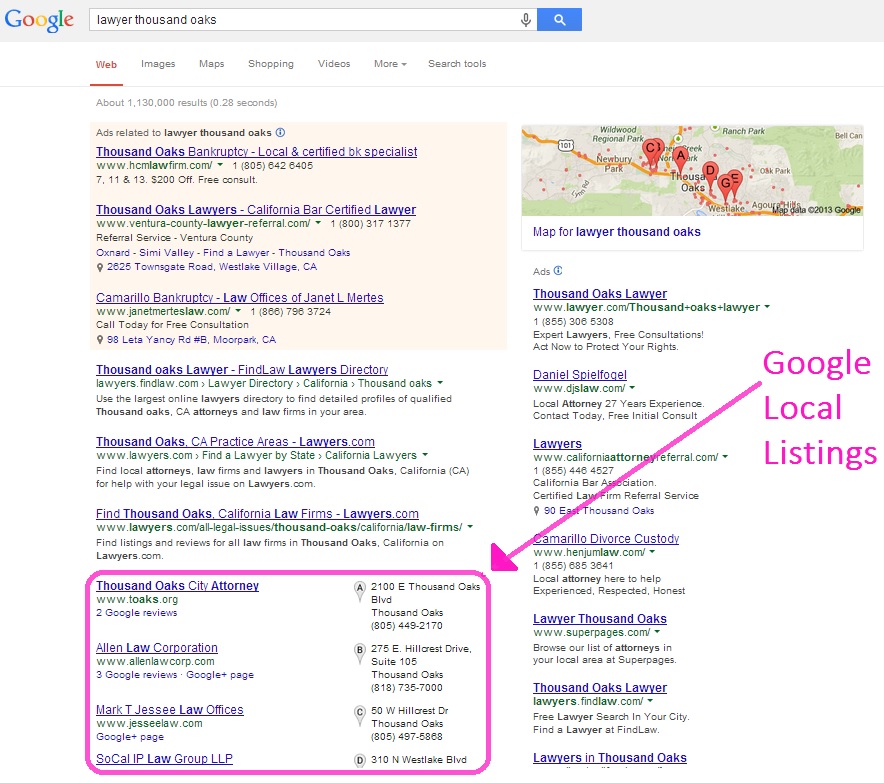SEO Strategies for Lawyers: Boost Traffic and Generate Leads
It’s no secret that your practice needs traffic and that you need to convert that traffic into qualified leads. SEO is pivotal when it comes to converting target consumers into paying consumers. In this post, we will dive into four SEO strategies for lawyers, along with actionable insights to rank higher in SEO and drive more traffic to your website.
- Target local keywords
- Secure inclusion in Google places and local directory
- Silo by practice areas
- Optimize the user experience
- FAQ: How can I implement effective SEO strategies for my law practice?
Target Local Keywords
To establish your firm as a brand and capture relevant traffic, it is essential to focus on local keywords. While ranking for highly competitive terms like “Los Angeles personal injury attorney” may take time, targeting your immediate location can yield early success. Suppose you are a personal injury attorney based in Thousand Oaks, serving clients throughout Southern California. In that case, you can optimize your website for keyword phrases such as “Thousand Oaks accident lawyer,” “Thousand Oaks law firm,” and “Personal injury attorney Thousand Oaks.” You can gradually expand your reach to more competitive regions by capturing traffic in your city first.

Secure Inclusion in Google Places and Local Directories
Emphasizing local search is vital for lawyers, and securing inclusion in Google Places and other local directories can significantly impact your online visibility. Google Places allows your law firm to appear prominently in search engine results pages (SERPs), Google Maps, and the Local Carousel. By optimizing your local listings and investing in major attorney directories, you can improve your ranking and attract valuable traffic. Follow a step-by-step guide to create and optimize your own Google Places local listing and leverage this powerful tool for SEO.
Silo by Practice Areas
Siloing your website according to practice areas is an effective way to provide targeted content and improve your chances of ranking for specific terms. Dedicate substantial content to each practice area, offering comprehensive information and insights. Try segmenting by different types of practices so that you enhance the UX and visibility for your target audience.
Optimize the User Experience
While directing traffic to your website is crucial, converting visitors into clients requires an impressive, professional, and informative site. Your law firm’s website should convey trust and expertise to visitors, compelling them to contact you. Ensure your website includes essential elements such as case studies, case results, testimonials, lawyer bios, an informative blog, engagement objects, and press coverage. These components establish credibility and foster a sense of trust, increasing the likelihood of conversion.
Remember, a successful online marketing campaign focuses not only on rankings but also on driving the right visitors to your website and creating a positive impression. By implementing these SEO strategies tailored for lawyers, you can enhance your online visibility, attract targeted traffic, and generate valuable leads for your legal practice.
In the next installment of our Legal Marketing Series, we delve deeper into leveraging specific elements to convert visitors into clients.
Ready to take your law practice to the top of search results and convert leads? Contact us today to supercharge your SEO strategy.
FAQ: How can I implement effective SEO strategies for my law practice?
Implementing effective SEO strategies for your law practice is crucial to stand out in a competitive online environment. As an expert in the field, I understand the unique challenges legal professionals face in optimizing their online presence. Let’s delve into the key insights and actionable tips to elevate your law practice’s SEO game.
Understanding Buyer Intent
Before diving into the technicalities of SEO, it’s imperative to grasp the buyer intent behind the search queries related to legal services. Users may seek information, legal advice, or even specific legal representation. Incorporating buyer intent keywords, such as “best law firm for personal injury,” into your content can enhance its relevance, capturing the attention of potential clients actively seeking legal services.
Content is Key
Crafting high-quality, relevant content is the backbone of any successful SEO strategy. Develop informative articles, blog posts, and case studies that address common legal concerns and provide valuable insights. Incorporate long-tail keywords naturally into your content, ensuring it resonates with your target audience while boosting your website’s search engine rankings.
Local SEO Optimization
For law practices, local visibility is paramount. Ensure your business is listed accurately on Google My Business and other local directories. Leverage location-specific keywords to enhance your chances of appearing in local search results. Encourage satisfied clients to leave positive reviews, reinforcing your credibility and authority in the legal field.
Mobile Optimization
In an era dominated by smartphones, mobile optimization is non-negotiable. Google prioritizes mobile-friendly websites in its rankings. Ensure your law practice’s website is responsive and offers a seamless user experience across various devices. This not only boosts your SEO but also caters to the needs of potential clients accessing your site on mobile devices.
Link Building Strategies
Building a robust backlink profile is essential for SEO success. Seek opportunities to collaborate with reputable legal websites, contribute guest posts, or be featured in online legal directories. Quality backlinks from authoritative sources enhance your website’s credibility in the eyes of search engines, positively impacting your ranking.
Elevate Your Legal Practice with SEO Mastery
Implementing effective SEO strategies for your law practice requires a multifaceted approach. By understanding buyer intent, crafting compelling content, optimizing for local searches, embracing mobile responsiveness, and strategically building backlinks, you position your practice for digital success. Stay abreast of industry trends, adapt your strategy accordingly, and watch your online presence and client base flourish.
Step-by-Step Guide: Elevating Your Law Practice with SEO Mastery
- Define Buyer Intent: Identify the specific legal services potential clients seek.
- Keyword Research: Conduct thorough keyword research, focusing on buyer intent keywords.
- Content Creation: Develop high-quality, informative content incorporating relevant keywords.
- Local SEO Optimization: Ensure accurate business listings on Google My Business and local directories.
- Mobile Optimization: Make your website responsive for optimal performance across devices.
- Link Building: Cultivate backlinks from reputable legal websites and directories.
- Stay Informed: Keep abreast of industry trends to adapt your strategy accordingly.
By following these steps, you’ll be well on your way to implementing effective SEO strategies and elevating your law practice’s online presence.
This article was updated on December 8, 2023.

4 Replies to “SEO Strategies for Lawyers: Boost Traffic and Generate Leads”
“A good online marketing campaign can do wonders for your practice, but the focus of your website should be on conveying trust and expertise. You want to make sure that your site speaks to visitors and compels them to contact you,”
Exactly right.
Most lawyers I talk to fall into the “just enough information to be dangerous category.”
They read SEO posts, get pitched by “experts,” and begin to form some general ideas about search engine optimization. Usually, they become hyper-focused on rankings.
They forget that “who” they drive to their site, and “what” their visitors think of what they find matters.
Hi Robert, in your last reply you told Kevin to devote “pages” on his website to other geographical regions. But how does that geography fit into the silo structure mentioned by Kristi in the article. Would you have a silo of one page articles for different geographical regions outside of your own?
Google appears to be getting much better at providing local results for non local searches. A few years ago if you searched dui attorney the results in Daytona Beach would be predominatly from California and other large markets. Now most of the results in natural search are local and not necessarily strong sites. Historically I’ve targeted terms like “Daytona Beach dui attorney” and was able to out perform my competitors. Suddenly they are doing better on searches such as “DUI attorney” and my traffic is down slightly this year. In the future do you think adding a location in the search will be less common as google gets better at providing accurate results for general searches without a location?
Thanks for the comment Kevin. Google has definitely been turning the dial up on localized results and have started including Google Map listings for most legal queries that don’t contain a geographic region. There will still be a portion of the searching public that will attach geographic regions to their queries, though. Especially if they were injured or arrested in a particular area and are looking for an attorney familiar with that region to assist them. The best you can do is make sure you always appear in maps for geographic regions where your practice has a physical address, invest in optimizing your regional listings on strong directories (like Yelp & Findlaw) and devote pages on your website to other geographic regions that are important to your practice. If you specialize in one area of law, try and establish yourself as an authority in the field by writing and publishing useful content that acquires you backlinks. Authorship and Link Equity can help you rank in regions where you don’t have offices.
LEAVE A REPLY









